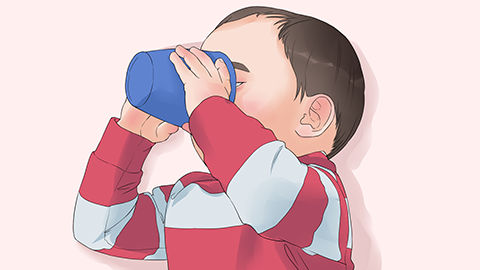What should I do if my baby has a fever and refuses to drink water?
Generally speaking, fever refers to an elevated body temperature. If a baby has a fever and refuses to drink water, it may be caused by oral discomfort, dietary habits, upper respiratory tract infection, herpangina, or acute suppurative tonsillitis. Parents can help the baby stay hydrated through general care, medication, or intravenous fluid administration. If symptoms persist or worsen, prompt medical attention is recommended for proper diagnosis and treatment. Below is a detailed explanation:

1. Oral Discomfort
Fever may cause a baby's oral mucosa to become dry and painful, especially after a high temperature has persisted for some time. This discomfort may cause the baby to resist drinking water. During the fever, parents can use clean gauze or cotton balls soaked in warm water to gently wipe the baby's mouth to keep it moist and reduce discomfort.
2. Dietary Habits
If a baby does not have a habit of drinking water regularly or dislikes the taste of water, it may be more difficult to encourage fluid intake during a fever. Parents should cultivate a routine of offering water at regular intervals throughout the day, helping the baby gradually adapt to the rhythm and taste of drinking water.
3. Upper Respiratory Tract Infection
Upper respiratory tract infections are primarily caused by viral infections, such as rhinovirus or coronavirus. The virus enters through the respiratory tract and replicates within the mucosal epithelial cells of the nasal passages and throat, causing inflammation. This often results in symptoms such as nasal congestion, runny nose, and cough, which can make drinking water uncomfortable for the baby. Possible accompanying symptoms include nasal congestion, runny nose, and cough. Treatment may include medications such as Pediatric Paracetamol, Chlorpheniramine Maleate Granules, Paracetamol Suspension Drops, or Chaihu Guizhi Decoction Granules, under a doctor's guidance. Parents may also try offering small, frequent sips of water or using a straw cup or dropper to assist the baby in staying hydrated.
4. Herpangina
Herpangina is mainly caused by enteroviruses. The virus enters the body through the mouth and replicates in the mucosal epithelial cells of the pharyngeal region, causing inflammation and the formation of vesicles. This leads to severe sore throat, particularly worsening during swallowing, which may cause the baby to fear and resist drinking water due to the pain. Other symptoms may include drooling, refusal to eat, and irritability. It is recommended to follow medical advice and use medications such as acetaminophen suppositories, Kehoujian Spray, or Kangfuxin Liquid. For babies experiencing difficulty drinking, applying Bingboran Powder (Ice Borax Powder) to the affected areas may help relieve pain, promote healing, and increase the baby's willingness to drink water.
5. Acute Suppurative Tonsillitis
Acute suppurative tonsillitis is most commonly caused by infection with group A beta-hemolytic streptococcus, although it may also be caused by Staphylococcus aureus, Streptococcus pneumoniae, or other bacteria. As the bacteria multiply, they invade the tonsils, causing inflammation and the formation of pus. This results in severe throat pain and difficulty swallowing, which becomes more pronounced when drinking water, leading the baby to refuse fluids to avoid increased pain. Accompanying symptoms may include coughing, runny nose, and sore throat. Treatment may involve antibiotics such as Penicillin V Potassium Tablets, Cefaclor for Oral Suspension, or Amoxicillin and Clavulanate Potassium for Oral Suspension, as directed by a physician. If necessary, intravenous hydration may be used under medical supervision to replenish fluids and electrolytes and prevent dehydration.
When a baby has a fever, parents should provide sufficient care and comfort to ease the baby's anxiety, which can help improve cooperation with drinking and treatment.




